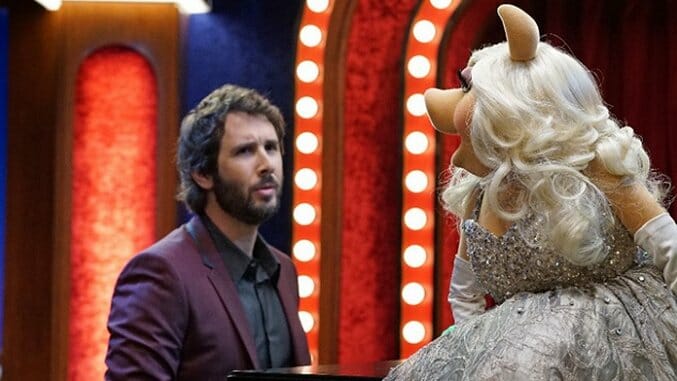
For as long as the Muppets have occupied a place on our televisions and in our hearts, Kermit the Frog has given their sentimental hijinks soul. He’s the Muppet’s shamrock-hued conscience. He gives them a reason to try, even though for the Muppets, “trying” is the inevitable first step toward calamity. So if you want to divine the source of the misanthropic taint staining the gang’s outlook in ABC’s The Muppets, look no further than Kermit himself. When Kermit keeps his chin up, the Muppets can bowl through any sort of adversity. (They’ve escaped obsolescence on a handful of past occasions thanks to his aw-shucks positivity, after all.) But when Kermit goes sour, it spreads like felt-borne streptococcus and makes everyone a grump.
Even though the new series has only a pair of episodes under its belt, you’ve probably figured out for sure whether or not The Muppets is your jam. There’s little hope that the show will take a turn toward the goofy optimism we associate with the Muppets as an idea; their trademarked absurdity remains intact, but it’s married with bad attitudes and the rigors of reality. Whenever the Muppets collide with our world, it usually ends up for the better. All of the droll human bullshit that entitles flesh-and-blood characters to their melodramatic ennui winds up dissolving before the indomitability of the Muppets’ collective spirit. What The Muppets does represent is the inverse of this effect: If Kermit, Fozzy, Miss Piggy, Scooter, Gonzo, and Bobo the Bear tripped into our world, we would inevitably sink them to our level. (Big Mean Carl, of course, is just big and mean no matter what hemisphere he exists in.)
So “Hostile Makeover” will likely be the tipping point where viewers decide to either stick with The Muppets or abandon ship. After last week’s tender conclusion, Piggy is on a rampage, and Kermit deduces that she’s upset at her lack of date for the People’s Choice Awards. What else to do when your porcine ex-old lady can’t find man candy to walk the red carpet? As a reminder that this is real life, Kermit turns to Piggy’s “free pass” list from when they were an item, but neither Keanu Reeves nor Jeff Goldblum are available (“Throw everything at Keanu Reeves!” leads to a classically Muppetish response), so he settles for Josh Groban. His ploy succeeds too well: Soon, Groban and Piggy are head over heels for each other, which means Groban has her ear, which means Up Late with Miss Piggy is in trouble.
There are a few choice bits of sage wisdom for living that everybody ought to heed: Never let your arms do all the work when you’re shooting hoops, never challenge a Sicilian when death is on the line, never eat ingredients you can’t pronounce, and never, for the love of god, ever make Dr. Teeth and the Electric Mayhem go acoustic. Groban’s meddling pushes Kermit to his utmost heights of scheming (which opens the door for a winking moment of meta-humor that hinges on Piggy’s status as late night’s only female host). Meanwhile, as Kermit tries to wrest his show from the clutches of Groban, Fozzy strikes up a buddy-buddy relationship with Jay Leno in a storyline that goes sadly nowhere, or, at least, nowhere happy.
But that’s kind of the point. The Muppets zigs when The Muppet Show, or any of the varying Muppet movies, might have zagged. There’s no compassion here, just chagrin and ignominy. Kermit manages to get what he wants out of his managerial machinations, but Fozzy snatches defeat from the jaws of victory. We so badly want him to see his dream realized, even if his dream is to open for Leno. Maybe the resolution to that plot thread is more emblematic of how The Muppets has tinkered with Muppet formula; it’s the kind of bad beat that might befall a character on The Office, and so it feels unnaturally severe in Muppet context.
Bitterness notwithstanding, “Hostile Makeover” happens to be as funny, if not funnier, than “Pig Girls Don’t Cry,” thanks in no small part to a surplus of sharp one-liners that range in subject matter from the Electric Mayhem’s fondness for “happiness,” the whereabouts of Gonzo’s mother, and gender fluidity. (Gonzo, in particular, kills, though Laurence Fishburne’s cameo is easily the show’s high point to date. Someone put him in the audience next to Statler and Waldorf, stat.) Frankly, “funny” is all that The Muppets needs to be, though the use of the documentary format still baffles. What’s the purpose? Is there a purpose? The presentation obviously isn’t The Muppets’ most divisive dilemma, but the lack of necessity adds extra sting to the show’s already bristly disposition.
Boston-based critic Andy Crump has been writing online about film since 2009, and has been scribbling for Paste Magazine since 2013. He also contributes to Screen Rant, Movie Mezzanine, and Birth.Movies.Death. You can follow him on Twitter. He is composed of roughly 65% craft brews.